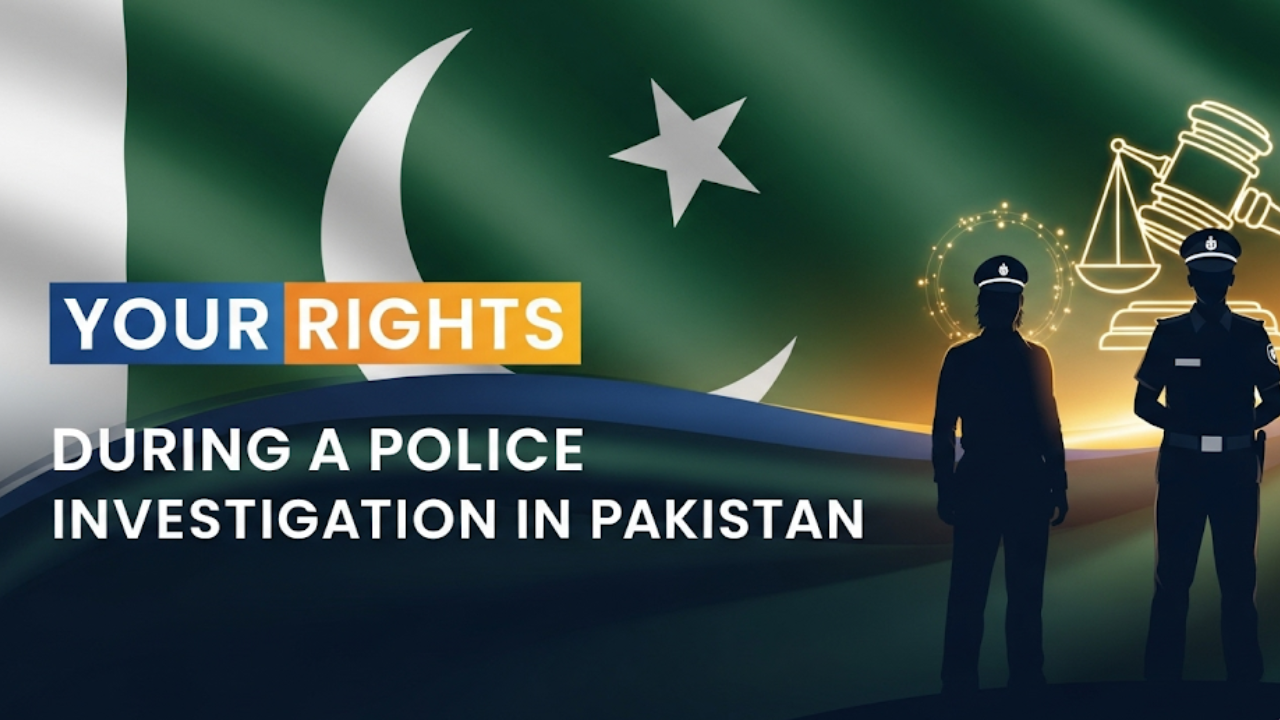Facing a police investigation in Pakistan can feel scary and confusing, especially if you’re in Punjab, where bustling cities like Faisalabad, Lahore, and Rawalpindi see frequent police activity. Whether you’re being questioned, detained, or arrested, knowing your legal rights can make a big difference. This guide explains your rights under Pakistani law in simple words, so you feel empowered and protected. At ASR Law Associates in Faisalabad, we help clients navigate police investigations with expert legal advice, both online and in-person. If you’re in Punjab or anywhere in Pakistan, this 2025 guide is for you. Let’s break it down!
Why Knowing Your Rights Matters
A police investigation can happen for many reasons—maybe you’re a suspect, a witness, or just at the wrong place at the wrong time. The laws in Pakistan, especially under the Code of Criminal Procedure 1898 (CrPC) and the Constitution of Pakistan, give you clear rights to protect you from unfair treatment. In Punjab, where police stations are busy and cases can escalate quickly, understanding these rights helps you stay calm and avoid mistakes.
For example, did you know you don’t have to answer every question the police ask? Or that you can demand a lawyer? Many people in Punjab don’t know these rights, leading to stress or even wrongful arrests. Recent data shows thousands of cases are filed yearly in Punjab’s courts, with many involving improper police procedures. This guide, brought to you by ASR Law Associates, will walk you through what to do if you’re questioned or arrested.
Your Rights During a Police Investigation in Pakistan
Let’s go step-by-step through your rights, focusing on what happens during questioning, detention, or arrest. These are based on the CrPC, Pakistan Penal Code (PPC), and constitutional protections like Article 10 (safeguards against arrest).
1. Right to Know Why You’re Being Questioned
- What It Means: The police must tell you why they’re questioning you. Are you a suspect, witness, or just a person of interest? They can’t just pull you in without a reason.
- Details: Under Section 54 of the CrPC, police must have a valid reason, like a First Information Report (FIR) or a complaint, to question you. In Punjab, FIRs are common in cases like theft or disputes, filed at local police stations.
- What to Do: Politely ask, “Why am I being questioned?” or “Is there an FIR against me?” If they don’t explain, don’t answer until you speak to a lawyer.
Tip: In Faisalabad, police stations like Batala Colony or Civil Lines can be busy. Always ask for the officer’s name and badge number for your records.
2. Right to Remain Silent
- What It Means: You don’t have to answer questions that might incriminate you. This is protected under Article 13 of the Constitution, which guards against self-incrimination.
- Details: You must provide basic info like your name and address, but you can refuse to answer questions about the case until you have a lawyer. For example, if police in Lahore question you about a fight, you can say, “I’ll speak with my lawyer present.”
- What to Do: Stay calm and say, “I choose to remain silent until I consult my lawyer.” Don’t feel pressured to talk, even if the police push you.
Punjab Note: In busy Punjab cities, police may try to rush you into talking. Stand firm but stay respectful to avoid escalation.
3. Right to a Lawyer
- What It Means: You have the right to contact a lawyer as soon as you’re questioned or detained. This is under Article 10A of the Constitution (right to a fair trial).
- Details: You can call a lawyer like those at ASR Law Associates to represent you. The police must allow this contact, and they can’t question you further until your lawyer arrives unless you agree.
- What to Do: Say, “I want to speak to my lawyer.” If you don’t have one, ask for time to find one. In Punjab, ASR offers online consultations, so you can get help fast, even from home.
Tip: Keep a lawyer’s number handy. For example, save ASR Law Associates’ contact for quick access in Faisalabad.
4. Right to Be Informed of Charges
- What It Means: If arrested, the police must tell you the exact charges against you. This is under Section 61 of the CrPC.
- Details: They must show you the FIR or explain the offense (e.g., theft under PPC Section 379). In Punjab, arrests often happen for crimes like fraud or violence, and police must follow this rule.
- What to Do: Ask, “What are the charges against me?” Demand to see the FIR in writing. If they refuse, note this for your lawyer—it could help your case.
5. Right to Avoid Illegal Detention
- What It Means: You can’t be detained without a legal reason or for too long without court approval. Article 10 of the Constitution protects against unlawful detention.
- Details: Police can detain you for up to 24 hours without charges (CrPC Section 61). After that, they must present you to a magistrate in Punjab’s local courts, like Faisalabad’s Sessions Court, for further detention or bail.
- What to Do: Ask, “Am I under arrest, or am I free to go?” If detained over 24 hours without a court appearance, your lawyer can file a habeas corpus petition.
Punjab Note: Overcrowded police stations in Punjab sometimes lead to delays. A lawyer can push for quick court presentation.
6. Right to Bail
- What It Means: You may have the right to apply for bail, depending on the crime. The CrPC distinguishes between bailable and non-bailable offenses.
- Details: For minor crimes (e.g., petty theft), bail is a right. For serious crimes (e.g., murder), it’s up to the court. In Punjab, bail applications are filed in family or sessions courts, often in cities like Rawalpindi or Multan.
- What to Do: Work with a lawyer to file a bail application quickly. ASR Law Associates specializes in bail petitions in Punjab.
Cost: Bail applications cost Rs. 10,000-50,000 in legal fees, plus court fees of Rs. 1,000-5,000.
7. Right to Humane Treatment
- What It Means: Police cannot use force, torture, or mistreat you. This is protected under Article 14 of the Constitution.
- Details: Physical abuse or coercion during questioning is illegal. In Punjab, reports of police misconduct are not uncommon, so document any mistreatment.
- What to Do: If mistreated, tell your lawyer immediately. They can file a complaint with the court or Punjab Police’s oversight body.
8. Right to Privacy During Searches
- What It Means: Police need a warrant to search your home or property, except in emergencies (CrPC Section 103).
- Details: If police in Faisalabad search your home without a warrant, it’s illegal unless they suspect immediate danger. They must also have witnesses present.
- What to Do: Ask to see the warrant and note any irregularities. Report issues to your lawyer.
9. Right to Family Contact
- What It Means: You can inform your family or friends if detained or arrested.
- Details: Police must allow you to call someone to let them know your situation. This helps you get legal help fast.
- What to Do: Request to contact your family or lawyer as soon as you’re detained.
What to Do During a Police Investigation in Punjab
Here’s a practical checklist to follow if you’re questioned or arrested in Punjab:
- Stay Calm and Respectful: Don’t argue or resist, as it can worsen things.
- Ask for Identification: Get the officer’s name, badge number, and station (e.g., Saddar Police Station, Faisalabad).
- Know Your Status: Ask, “Am I a suspect or witness?” This clarifies your role.
- Exercise Your Right to Silence: Only give basic info until your lawyer arrives.
- Contact a Lawyer Immediately: Call ASR Law Associates for quick advice via online consultation.
- Document Everything: Note dates, times, and what was said or done.
- Avoid Signing Anything: Don’t sign statements without your lawyer reviewing them.
- Request Bail if Arrested: Work with your lawyer to file a bail application.
Common Mistakes to Avoid During a Police Investigation
- Talking Too Much: Answering questions without a lawyer can harm your case.
- Not Knowing Your Rights: Ignorance leads to unfair treatment.
- Signing Documents Blindly: Statements or confessions can be used against you.
- Resisting Arrest: This can lead to extra charges under PPC Section 186.
- Not Contacting a Lawyer: Delaying legal help can weaken your defense.
In Punjab’s busy police stations, like those in Lahore or Faisalabad, these mistakes are common. A lawyer can prevent them.
Special Notes for Punjab Residents
- Busy Courts and Police Stations: Punjab’s large population means police and courts are often overloaded. For example, Faisalabad’s family and sessions courts handle thousands of cases yearly, so delays are common. A lawyer speeds things up.
- Local Expertise: ASR Law Associates knows Punjab’s police and court systems, from Lahore High Court to local thanas.
- Online Support: If you’re in a remote part of Punjab, our online consultations save you travel time.
FAQs on Your Rights During a Police Investigation in Pakistan
Do I have to answer police questions?
No, except for basic info like your name. You can stay silent until your lawyer is present.
Can police arrest me without a warrant?
Yes, for serious crimes caught in the act (CrPC Section 54). Otherwise, they need a warrant.
How long can police detain me without charges?
Up to 24 hours. After that, they must take you to a magistrate.
What if I’m mistreated by police in Punjab?
Tell your lawyer immediately. They can file a complaint or petition the court.
How much does a lawyer cost for a police investigation?
Fees vary (Rs. 20,000-100,000), but ASR offers affordable options and online consultations.
Are there any 2025 updates to police investigation laws?
No major changes, but Punjab Police are under pressure to follow CrPC rules strictly.
Why Hire a Lawyer During a Police Investigation?
A lawyer protects your rights, ensures fair treatment, and builds a strong defense. At ASR Law Associates, we:
- Offer expert advice in Punjab’s legal system.
- Provide online consultations for quick help.
- File bail applications and challenge illegal detentions.
- Fight for you in court with 20+ years of experience.
Don’t face the police alone—get help now.
Conclusion: Stay Informed, Stay Protected
A police investigation doesn’t have to be overwhelming. By knowing your rights—silence, lawyer, fair treatment—you can face questioning or arrest with confidence. In Punjab, where police activity is high, having a trusted lawyer like ASR Law Associates makes all the difference.
Ready to protect your rights? Contact ASR Law Associates in Faisalabad for expert legal support.


